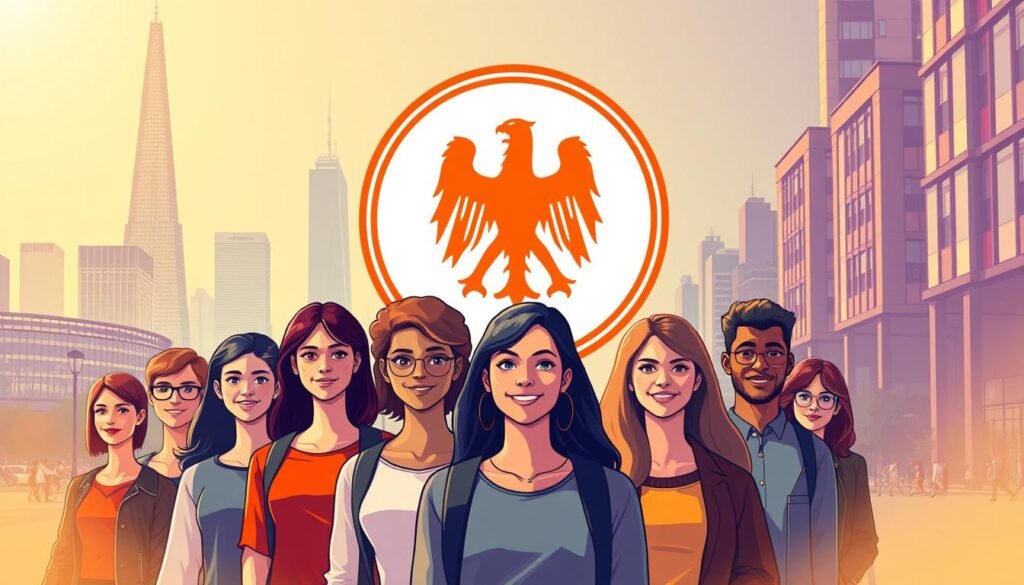
Your path to extra support starts here. The deutschlandstipendium gives you €300 per month through a public-private co‑funding model. That mix helps keep funding steady and grows opportunities at many German universities.
At the University of Mannheim, 131 students received awards in 2024/25. HfMDK Frankfurt used its full 8% allocation to support 99 students. TUM raised €120,000 to add 33 more scholarships next year.
In short, this stipendium rewards achievement and social commitment while recognizing life circumstances. You’ll learn how the €300/month fits your studium, how förderung works, and what steps to take on the next seite of this guide.
What the Deutschlandstipendium offers you right now
A reliable monthly top-up of 300 euro gives you room to breathe during your semesters. You get €300 each month that you can spend on rent, materials, travel, or unexpected costs. The payment is flexible so you can focus on study and impact.
How the funding works:
How the €300 per month funding works for students
Funding comes from a co‑funding model: half federal money and half from private backers. Sponsors, foundations, and alumni called fördernden share the cost. This split keeps the program stable year to jahr and widens support across campuses.
Who benefits: high achievers with drive and social engagement
You are a strong fit if you combine good grades with initiative volunteering, leadership, sports, or creative work. Commitments and life situations like caregiving or migration background also count.
Real-world impact at German universities today
- University of Mannheim awarded 131 grants in 2024/25.
- HfMDK Frankfurt supports 99 studierende and fully used its 8% allocation.
- TUM’s Matching Challenge raised €120,000 to fund 33 more stipendien next cycle.
Deutschlandstipendium eligibility and what selection committees look for
Your application stands out when you show both academic strength and a history of tangible community impact. Committees weigh three areas: performance, engagement, and personal context.
Performance, engagement, and circumstances that count
Performance: Above‑average school or university results are essential. Panels expect clear evidence of your grades and progress during your studiums.
Engagement: Long-term volunteering, elected student roles, sports achievements, or leadership in initiatives all matter. Record hours and timelines so committees can verify your impact.
Personal circumstances: Facts like migration background, first‑generation status, caregiving, child‑rearing, or BAföG receipt help explain your story and can strengthen your case.
Programs and study phases supported
You can be supported in Bachelor, Staatsexamen, and Master tracks while within the standard period of study. First and subsequent degrees are eligible.
- You cannot apply as a PhD candidate under this stipendium; seek doctoral funds elsewhere.
- Renewals depend on annual performance checks, usually in spring.
- Prospective students may apply, but awards depend on starting the program.
Need more details on eligibility and steps? See the full eligibility guide.
How to apply and get funded this year
Plan your application calendar now so deadlines don’t block your chance at funding. A short prep push pays off: get files ready, write a focused motivation letter, and submit online during the window.
Current timelines you shouldn’t miss
Example University of Mannheim 2025: Apr 1–Jun 2 for enrolled and Master applicants; Jun 3–Jul 16 for Bachelor applicants. Mark these seite dates and set reminders two weeks before each deadline.
Your application checklist
- Motivation letter: up to 3,800 characters, addressed to the selection committee.
- CV, school‑leaving certificate, current transcript (GPA if >30 ECTS; machine-generated accepted).
- Prior degree certificates, awards (last 2 years), work experience (2+ years in last 5 years).
- Internships (8+ weeks in last 5 years) with duration/hours; volunteering/initiatives (≥160 hrs/year, last 2 years).
- Signed confirmations for each role with dates, total hours, and organization (required by selection panels).
Submission steps and what happens after
- Upload a single, clearly named PDF package via the online portal.
- Edit and verify files before final submission late or partial uploads are usually rejected.
- Committees review applications over summer; decisions arrive by email in autumn.
- Payments typically start in October and are retroactive to August once enrollment is confirmed.
Combining this support with other funding
Good news: BAföG can be combined without reductions. ERASMUS is fine if you stay enrolled. DAAD partial grants are compatible; full DAAD scholarships usually are not.
Note: mandatory internships and study‑related abroad stays can be covered. A leave of absence typically pauses payments unless exceptions apply.
Beyond money: sponsors, events, and your network
Sponsors and campuses team up to give you more than financial aid they open doors to people, projects, and real-world experience.
You’ll meet mentors from foundations, alumni, and companies who care about social impact and your growth. TUM’s Matching Challenge 2025 raised €120,000 and added 33 extra awards thanks to donors like the Anneliese Pfannenberg Foundation and Friends of TUM.
Career-building events and ideational support you can join
Expect practical activities: company tours, skills workshops, guest lectures, and sector days that turn study into work-ready experience.
- SAP deep dives and MAN Campus Day connect you with recruiters and project leads.
- Plant tours at Wacker Chemie and Westlake Vinnolit show industry processes firsthand.
- Talks on AI in medicine and quantum computing broaden your horizon for future careers.
You’ll get event links as a scholarship holder so you can register early. These moments help you build relationships that last beyond the semester and enrich your studiums and professional förderung.
Explore related scholarship opportunities to widen your network and planning for the coming jahr.
Take the next step toward your stipendium today
A short push now checking eligibility and collecting documents can open funding doors. Check your university’s seite for the current application window and set clear reminders for deadlines.
Prepare a concise motivation letter, verify your hours and confirmations, and upload a single PDF early to avoid portal issues. Reach out with questions: TUM student hotline +49 89 289-28065 (Mon–Fri 9–12 a.m.).
Remember that decisions often arrive in autumn and payments usually start in October, retroactive to August. If you want to support sponsors or learn more about fördernden, contact Susanne Birkeneder at +49 89 289-25466.
Act now: gather documents, finish your draft, and submit early to give your studium the extra förderung it needs this jahr.

